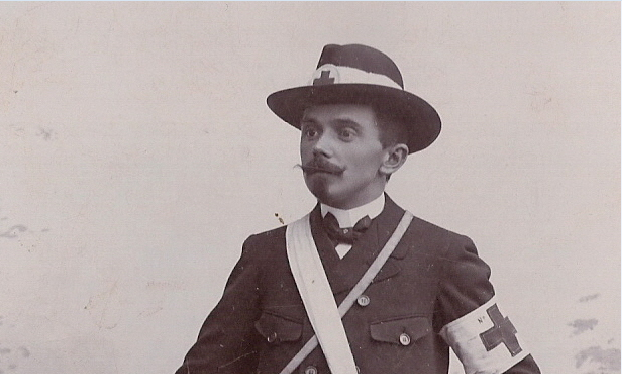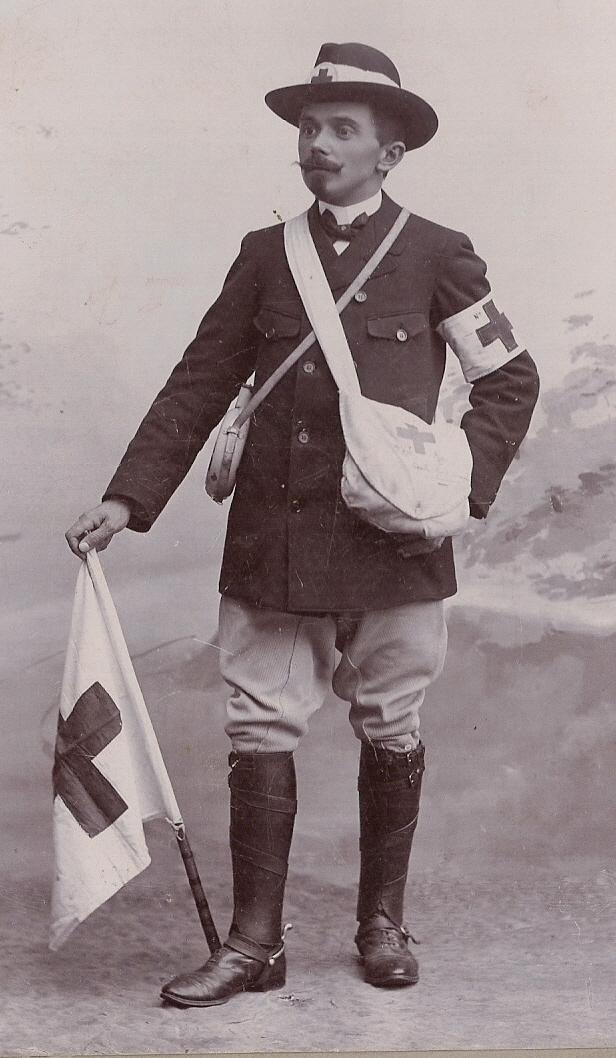
Disclaimer: Any views expressed by individuals and organisations are their own and do not in any way represent the views of The Heritage Portal. If you find any mistakes or historical inaccuracies, please contact the editor.
Jannie Roggeband, a Dutch citizen, was a field ambulance volunteer during the Anglo Boar War (1899-1902). Roggeband had a powerful accolade published in the Ficksburg community newspaper on 4 January 1923, a few days after the death of General George Alfred Brand (10 February 1875 – 24 December 1922). General Brand, one of President and Lady Brand’s 11 children, passed away at the young age of 47. A family photograph circa 1882, in the author’s collection, shows George and his older siblings, 7 of which were boys.
As a collector and researcher of Anglo Boer war related images, the author, on occasions, finds absolute gems where a letter or newspaper clipping is found with a photograph that relates to the “sitter” (person in the photograph), who was either a participant in the Boer War or simply a citizen caught up in the war.
Photographs in themselves tell stories, but to find the Roggeband photograph with a newspaper clipping certainly provides insight into the personalities as well as the nature of the relationships between various parties during the war (sometimes opposing parties).
Based on the author’s research, Jannie Roggeband has not been identified or named as a Dutch Volunteer in any previous research conducted. No mention, for example, is made of him in the recently published book by Chris Schoeman on the Dutch involved in South Africa during that era (Brothers in Arms: Hollanders in the Anglo Boer War).
This article not only reflects on the personality of Brand but also attempts to record and acknowledge Roggeband himself. It is the opinion of the author that this is the first time that an image of Jannie Roggeband is being published.
Photograph taken by Dutch photographer JJ van Melle based at Roosendaal
At the outbreak of the war, medical equipment, doctors, nurses and volunteers poured in from countries such as France, Holland, Germany, Ireland, Scandinavia and Russia. Roggeband was one of the many selfless volunteers who offered their service, not only nursing the Boers, but also the British. It has been suggested that medical attention received by injured Boers during the war was of the same high standard than that received by the British forces.
The accolade written by Roggeband reads as follows:
Wylen de Boere Generaal (George Brand (1899-1902)
Op 11 Woensdagmiddag, 27 Desember 1922 om 3 uur werd het stoffelik overschot ter aarde besteld van ons zo geliefde Boere Generaal uit de Driejarige Oorlog, 1899-1902, Generaal George Brand.
Terwyl verscheidene van onze oud-stryders tegenwoordig waren, werden vele anderen gemist, die door de gebeurtenissen der laaste jaren van hem verwyderd waren. Nogtans kunnen diegenen, die hem liefhadden en beminden (vooral wy uitlanders) aan hem gedenken als aan de dappere, overmoedige, ‘t recht liefhebbende, doortastende, vaderlandslievende Boere Generaal, Vrystater in merg en been.
Generaal George Brand was de uitverkorene onder de uitlanders. In ons commando bevonden zich van uit de Kaapkolonie 1901 Hollander, Duitsers, Schandenaviers en Ieren. Vele gevechten heb ik in de guerilla oorlog meegemakt en na ‘t gevecht, wanneer Generaal Brand van zyn trouwe commando paard afklom, was zyn eerste bezoek aan de zieke en gewonden burgers. In het personeel van het hospitaal en veldambulans stelde hy biezonder belang. Altyd was het: Jannie zorg toch good voor myn burgers. Ons laaste veld hospital was op de plaats Wesselsrust, dist. Smithfield.
In de gevechten was kommodant Piet Krog, tans van Ficksburg, zyn rechterhand, en ook zyn biezonder geliefde oud-veldkornet, Oom Fanie Joubert, tans van Kafferberg, Bloemfontein. In het Rodekruis, het werk der barmhartigheid, viel my de eer te beurt dit te zyn. De gevangeneming van my met myn amulans wagens (niet minder dan zeven maal) en dat wel van een tot vyf en twintig dagen door grote Engelse generaals en kolonels. Majoor Coopman gaf my zelf een vrygeleide van 50 man met officieren naar Generaal Brand’s commando terug voor myn bewezen diensten na ‘t gevecht aan Britse soldaten. Dit was het respekt zeide Majoor Coopman, voor zo ‘n geduchte tegenstander als Generaal Brand, en voor al uw bekende en bewezen diensten aan Brittanje’s soldaten dat wy u moeten terugzenden.
Wanneer ik als gevangene Boere Ambulans gewonde soldaten hielp verplegen was de vraag door de Engelse Generaals, waarom zo ywerig en bekwaam uw vyanden te helpen. Myn antwoord was, dit is myn order van Generaal Brand, en de ziel van het ambulans werk aan gewonden en zieken, vriend of vyand.
Mevrouw Brand, vroeger mej van der Merwe was uit Bethulie kamp weggelopen en werd by haar aankomst in ons commando opgenommen als nurse en in ons hospitaal geplaast waar zy een zegen verspreide aan zieken en gewonden, aan vriend en vyand in ons hospitaal verpleegd.
De Engelse colonel, Col. Lord Besant, wier soldaten zy had verpleegd in ons hospitaal had zyn waardering uitgesproken aan Kapt O’Donnell van de Boere Ambulans voor het edele werk door de nurses gedaan, en voor de goede en strenge orde aan Generaal Brand’s hospitaal en veld Ambulans.
De vyand erkende deze onverscrokken dappere Vrystater, Generaal George Brand – hoeveel te meer wy die rondom het graf stonden oudstryders, nurses en veldambulansen van 1902, allen Nationalisten? Wat Generaal Brand in de Driejarigen Boere Oorlog heeft gedaan, vooral wy die tot op het einde samen met hem in ‘t veld waren en de leuze “Overwinnen of sterven” by de vaderlandse vlag, oranje, rood, wit en blouw, elkander hadden trouw gezworen, zullen altyd in liefde gedenken aan een der dapperste zonen van de Oranje Vrystaat. Zyn naam zal in de geschiedenis van Zuid-Afrika, uit die tyd 1899-1902, met eer worden vermeld.
Als oud Hollander en vrywilliger Boeren Veld Ambulans 1902 heb ik de begrafnis te Bloemfontein bygewoond om de laaste eer te bewyzen aan myn gestorven, maar geliefde, dappere Vrystater en edelmoedige Boere Generaal, George Brand.
U, heer editeur, dakend voor opnamen, teken ik met achting.
One historically significant aspect raised by Roggeband above is that he was arrested on 7 occasions by the British but released every time and even, on one occasion, escorted back to a Boer camp by 50 British soldiers.
Brand was clearly well respected and loved by various parties during the war. The accolade above uses words such as brave, decisive, a patriotic South African, Free Stater through and through and a man of formidable opposition that was not easily shaken.
Roggeband also mentions that after each conflict Brand would get off his horse and visit not only the sick and wounded but he also gave specific attention to hospital and field ambulance staff.
To the confusion of the British, Brand also instructed Roggeband to attend to wounded British soldiers.
Roggeband concludes that Brand’s name will always be mentioned with honour going forward.
Brand was clearly a natural leader in that he attracted this spontaneous response from a Dutch Volunteer some 20 years after the war. It is not clear whether Roggeband remained in South Africa after the war or whether he returned to the Netherlands.
Carol is passionate about South African Photographica – anything and everything to do with the history of photography. He not only collects anything relating to photography, but also extensively conducts research in this field. He has published a variety of articles on this topic and assisted a publisher and fellow researchers in the field. Of particular interest to Carol are historical South African photographs. He is conducting research on South African based photographers from before 1910. He is also in the process of cataloguing Boer War stereo images produced by a variety of publishers. Carol has one of the largest private photographic collections in South Africa.
Comments will load below. If for any reason none appear click here for some troubleshooting tips. If you would like to post a comment and need instructions click here.

